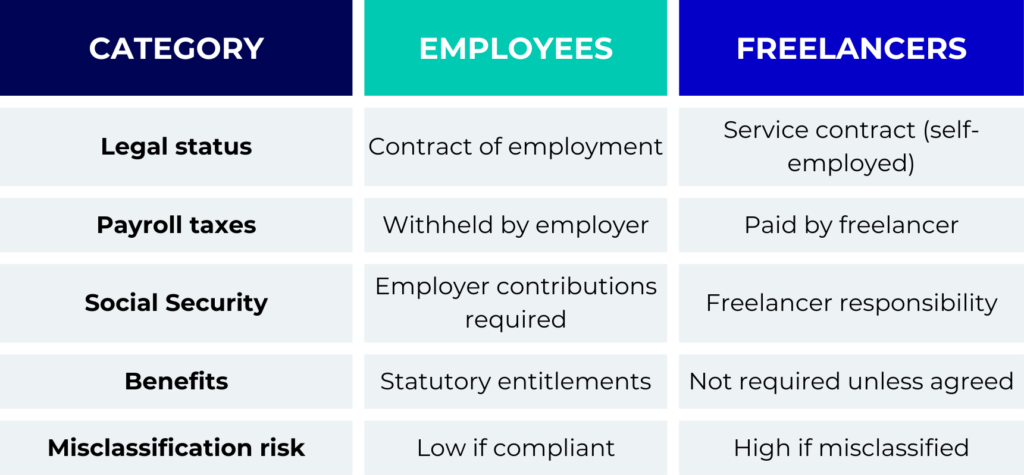14 April 2025
How to manage payroll for employees and freelancer workers in Switzerland
Switzerland has long been recognised as an economic hub, attracting international businesses and skilled professionals. With the rise of remote work and blended workforce models, many companies find themselves managing both full-time employees and independent freelancers. This shift can increase flexibility and improve access to specialised talent but also introduce significant payroll complexities.
Managing payroll in Switzerland means adhering to strict labour and tax regulations, as well as understanding the distinct obligations associated with each worker type. Employers must navigate employment contracts, social contributions, tax filings, and misclassification risks while complying with federal and cantonal requirements.
This guide explores best practices for managing payroll for employees and freelance workers in Switzerland, while highlighting how an Employer of Record (EOR) can help ensure compliance and simplify operations.
Payroll rules for employees in Switzerland
Employment relationships in Switzerland are typically well-defined, with clear contractual obligations, statutory benefits, and employer contributions. Understanding the payroll requirements for employees is critical to maintaining compliance.
Swiss law mandates that employment contracts outline the rights and responsibilities of both parties. This includes the job role, salary, working hours, and provisions for paid leave. Contracts can be written or oral, but a written document is recommended to avoid disputes. For payroll purposes, the contract must specify the gross salary, payment intervals, and any additional benefits such as bonuses or allowances.
Social security contributions
Employers in Switzerland are responsible for contributing to the country’s social security system on behalf of their employees. This includes payments to:
- AHV/AVS (Old Age and Survivors’ Insurance): A mandatory contribution to support retirees and survivors.
- ALV (Unemployment Insurance): Provides financial protection in case of job loss.
- BVG/LPP (Occupational Pension Scheme): A workplace pension that supplements the state pension.
- Family Allowances: Cantonal rules govern the allocation of family benefits for employees with dependents.
These contributions must be calculated correctly and deducted from the employee’s gross salary before payment. The employer is also responsible for matching to many of these schemes, effectively doubling the overall cost of social insurance.
Payroll taxes and reporting
Swiss employers are required to withhold federal, cantonal, and municipal income taxes from employees’ wages. The specific rates and rules depend on the employee’s place of residence and work. Accurate and timely tax withholding is critical to avoid penalties. Employers must also issue detailed payslips each pay period, showing gross pay, deductions, and net pay.
Payroll rules for freelance workers in Switzerland
Freelancers, also called self-employed individuals, operate under a completely different set of rules. Unlike employees, they are not tied to a single employer, and their income is typically derived from multiple clients. This distinction affects payroll, taxation, and social contributions.
Under Swiss law, freelancers are independent contractors who bear the risks and responsibilities of running their own businesses. They are not entitled to statutory employment benefits and must handle their own tax and social insurance obligations. To be considered a freelancer, an individual must demonstrate autonomy, control over their working methods, and the ability to serve multiple clients.
Invoicing and VAT
Freelancers in Switzerland typically issue invoices to their clients rather than receive payslips. If their annual turnover exceeds CHF 100,000, they must register for and charge VAT (Value Added Tax) on their services.
VAT must be collected from clients and remitted to the Swiss tax authorities. Freelancers are also responsible for maintaining proper financial records and submitting VAT returns, adding a layer of administrative complexity.
Social security contributions
Although not mandatory for all, many freelancers voluntarily contribute to Switzerland’s AHV/AVS system to ensure they qualify for a state pension. Those who do so must pay both the employer and employee portions themselves, which can be a significant financial burden. Freelancers are also free to arrange their own occupational pension plans, although law does not require this.
Key differences between employees and freelancers
Businesses must understand the core differences between employees and freelancers to effectively manage payroll for a mixed workforce. These distinctions shape payroll obligations and influence compliance requirements.


Compliance risks to avoid
Managing payroll for both employees and freelancers involves several compliance risks. Missteps can lead to legal disputes, financial penalties, and reputational damage.
1. Misclassification of workers
One of the most significant risks is misclassifying freelancers as employees or vice versa. A misclassified worker may claim unpaid benefits, holiday pay, or overtime, triggering costly legal disputes. Authorities may also reclassify a freelancer as an employee retroactively, resulting in back payments for social security contributions and taxes.
2. Tax and social security non-compliance
Failing to withhold the correct amounts for social security and income tax can result in penalties. Companies must ensure accurate deductions and timely remittance to the appropriate authorities. Differences in cantonal regulations add another layer of complexity, requiring careful attention to local rules.
3. Poor documentation and record-keeping
Employers and freelancers alike must maintain clear, thorough records. Missing or incomplete documentation—such as invoices, payslips, or tax filings—can trigger audits and fines.
How a Swiss Employer of Record can simplify payroll for employees and freelancers
A Swiss Employer of Record (EOR) offers a practical solution for businesses managing a mixed workforce. By acting as the legal employer for employees and coordinating contractor payments, an EOR helps companies ensure compliance with Swiss labour and tax laws.
For employees
The EOR handles all employment-related obligations, including drafting employment contracts, managing payroll, and remitting social contributions. By doing so, it eliminates the need for the client company to establish a local legal entity. The EOR’s expertise ensures that all tax deductions and benefits are processed correctly and on time.
For freelancers
While freelancers typically manage their own taxes and social insurance, an EOR can support compliance by helping companies verify freelancer status, set up clear contracts, and maintain proper payment records. This reduces the risk of misclassification and streamlines payment processes.
Benefits of Using an EOR:
- Compliance assurance: The EOR ensures that payroll processes meet Swiss labour and tax standards, reducing the risk of fines and disputes.
- Administrative relief: By handling payroll calculations, reporting, and contributions, the EOR frees up time for HR and finance teams.
- Risk mitigation: The EOR acts as a buffer, ensuring that both employees and freelancers are engaged under the correct legal framework.
Partner with a Swiss Employer of Record
Managing payroll for both employees and freelancers in Switzerland requires a solid understanding of local labour laws, tax regulations, and compliance risks. Employees have specific entitlements and statutory contributions, while freelancers operate as independent contractors responsible for their own taxes and social insurance. Misclassification, non-compliance, or poor record-keeping can lead to legal and financial challenges.
Contact us today if you’re looking for a simplified, compliant approach to managing your workforce in Switzerland. Partnering with a Swiss Employer of Record ensures that employees receive the correct benefits, freelancers are properly engaged, and all tax and social security obligations are met. With our expertise, you can focus on growth and success, confident that your workforce is handled efficiently and in full compliance.
Read more
Contact us


Contact our local expert for tailored guidance on Swiss employment solutions.
